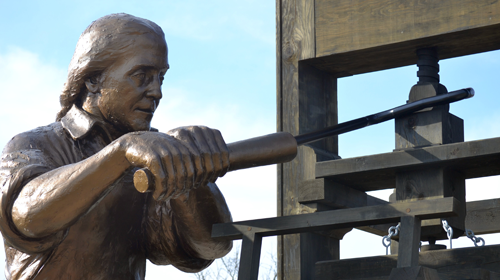
We're used to talking about press freedoms in the context of the First Amendment: "Congress shall make no law . . . abridging the freedom . . . of the press." But, especially in light of the ACLU's recent FBI report, Unleashed and Unaccountable, we could stand to reflect on the very close relationship between the Fourth Amendment, privacy rights, and press freedom.
In particular, the very phenomenon used in pre-revolutionary America to oppress the colonists—and earlier in Britain to target the press—is happening again today. The genesis of the Fourth Amendment lay in the abuse of general warrants, particularly the use of "writs of assistance" in the American colonies. They were most famously used by British customs inspectors in colonial America to search anything, anywhere, anytime for tax evasion, without any suspicion of wrongdoing or any indication that the search would turn up anything incriminating.
But, and as extensively detailed in a major Supreme Court case from the mid-1960s, Stanford v. Texas, the use and abuse of general warrants goes much further back, including back across the pond. In the religious and political strife of the 16th through 18th centuries, general warrants were "systematically used" to give the English king's men "roving commissions to search where they pleased in order to suppress and destroy the literature of dissent, both Catholic and Puritan."
In fact, one of the major British cases invalidating a general warrant, Entick v. Carrington, is really a case about freedom of the press. Acting on the orders of Lord Halifax, several king's messengers broke into the home of the publisher of a pamphlet called "The Monitor, or the British Freeholder;" ransacked the place; and carted off a bunch of papers wholesale (presumably to peruse for royal libel later, at their leisure). The publisher then sued for trespass (against the king, remember) and surprisingly won.
Key to the decision was this observation: "[t]his power . . . is an execution upon all the party's papers . . . . His house is rifled; his most valuable secrets are taken out of his possession, before the paper for which he is charged is found to be criminal . . . and before he is convicted either of writing, publishing, or being concerned in the paper" (emphasis added). Translation: positively, no dragnets.
Unfortunately, the events of the last decade or so have dulled that 250-year-old pearl of wisdom, both with respect to privacy generally and to freedom of the press specifically. As we now know through the Snowden documents, the government has adopted the opposite approach for detailed communications records. We need everything, they say, so we can search it quickly—not unlike the general warrants of Georgian Britain, which were used to search first and then look for bad stuff.
For press freedoms, the story is just as bleak. As detailed in Unleashed and Unaccountable (page 32), the FBI has repeatedly used certain powers—including so-called "exigent letters," for which it had no legal authority, and grand jury subpoenas—to seize sizeable quantities of records from the news media in the hopes of ferreting out national security "leakers." Several of the requests, including the subpoena for call records covering more than 100 Associated Press phone lines, appear uncomfortably like a blanket attempt to get "all the party's papers."
Fortunately, driven by the AP uproar and the revelations that an FBI agent had characterized a reporter as a possible spy for attempting to solicit classified information, the Department of Justice has taken steps to rein in U.S. attorneys and the FBI. Additionally, Congress and the administration have breathed new life into a federal media "shield" law, which, though quite far from perfect, is a good incremental step.
Part of the genius of those venerable British decisions is that they linked personal privacy with free expression. If the government can issue general warrants, it's going to use them to bring the press to heel, which hurts us—the beneficiaries of the fourth estate's efforts to expose government wrongdoing—the most. For that reason, privacy and press freedoms will forever be inextricably linked, and, indeed, each serves as a guardian of the other.
Learn more about the government surveillance and other civil liberties issues: Sign up for breaking news alerts, follow us on Twitter, and like us on Facebook.



